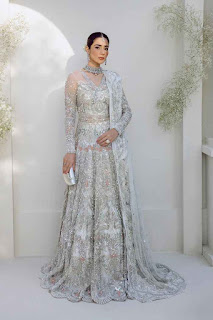Nikkah Dress Color Symbolism: Traditions and Meanings

In the realm of bridal fashion, the Nikkah ceremony holds profound significance, marking the union of two souls in matrimony with sacred vows and traditions. Central to this celebration is the choice of attire, particularly the Nikkah dress, which serves as a reflection of cultural heritage, personal style, and symbolic significance. In this article, we delve into the traditions and meanings behind Nikkah dress colors, exploring the rich symbolism embedded in this timeless tradition. Additionally, we'll highlight the contributions of renowned designers such as Astra Hussain Rehar, Zesty Hussain Rehar, and Lotus Hussain Rehar, known for their expertise in crafting exquisite bridal ensembles.
Understanding Nikkah Ceremony Traditions
The Nikkah ceremony, also known as the Islamic marriage contract, is a sacred union between a bride and groom in the presence of witnesses and a religious officiant. Rooted in Islamic tradition, the Nikkah ceremony follows customs and rituals that vary across different cultures and regions. While the ceremony itself is steeped in tradition and religious significance, the choice of attire for the bride holds particular importance, symbolizing purity, modesty, and the beginning of a new chapter in life.
Symbolism of Nikkah Dress Colors
In many cultures, the color of the Nikkah dress carries symbolic meaning, reflecting cultural traditions, personal beliefs, and auspicious symbolism. While white is often associated with purity and innocence in Western cultures, the symbolism of colors in Nikkah dresses varies widely across different regions and cultural contexts. Let's explore some common Nikkah dress colors and their associated meanings:
White:
White is a classic choice for Nikkah dresses, symbolising purity, innocence, and spiritual significance. For many brides, wearing a white Nikkah dress signifies the beginning of a new chapter in life and a commitment to purity and fidelity in marriage.
Red:
Red is a traditional color in many cultures, symbolizing love, passion, and auspiciousness. In Islamic tradition, red is often associated with joy and celebration, making it a popular choice for Nikkah dresses. Brides who choose red for their Nikkah attire may do so to symbolize their love for their partner and their commitment to a lifelong partnership.
Gold:
Gold is often associated with wealth, prosperity, and abundance, making it a popular choice for Nikkah dresses with Zesty Hussain rehar. In many cultures, gold symbolizes good fortune and blessings, reflecting the hope for a prosperous and harmonious marriage. Brides who choose gold for their Nikkah attire may do so to invoke blessings for their union and future together.
Contemporary Trends in Nikkah Dresses
In recent years, there has been a shift towards contemporary interpretations of Nikkah dresses, with brides embracing a wider range of colors, styles, and designs. Designers like Astra Hussain Rehar, Zesty Hussain Rehar, and Lotus Hussain Rehar have played a pivotal role in shaping this trend, offering brides a diverse array of options that blend traditional elements with modern aesthetics.
Astra Hussain Rehar:
Astra Hussain Rehar is known for her bold and avant-garde designs that push the boundaries of traditional bridal fashion. Her Nikkah dresses often feature vibrant colors, intricate embellishments, and innovative silhouettes that reflect her unique creative vision. Brides who choose Astra Hussain Rehar for their Nikkah attire make a bold statement, embracing modernity while honoring tradition.
Zesty Hussain Rehar:
Zesty Hussain Rehar is celebrated for her eclectic and vibrant designs that capture the essence of Pakistani culture and heritage. Her Nikkah dresses are characterized by rich colors, intricate embroidery, and exquisite craftsmanship that resonate with brides seeking a traditional yet contemporary look. Brides who choose Zesty Hussain Rehar for their Nikkah attire embrace cultural authenticity with a modern twist.
Lotus Hussain Rehar:
Lotus Hussain Rehar is renowned for her elegant and sophisticated designs that exude timeless beauty and grace. Her Nikkah dresses feature soft pastel hues, delicate fabrics, and understated embellishments that evoke a sense of romance and femininity. Brides who choose Lotus Hussain Rehar for their Nikkah attire embody understated elegance and timeless charm on their special day.
Conclusion
In conclusion, the choice of Nikkah dress color holds profound significance in bridal traditions, symbolizing love, purity, and cultural heritage. Whether brides opt for traditional hues like white and red or embrace contemporary interpretations in bold colors and designs, the Nikkah dress serves as a reflection of their personal style, beliefs, and aspirations for marriage. Designers like Astra Hussain Rehar, Lotus hussain rehar, and Lotus Hussain Rehar continue to inspire brides with their innovative designs and creative vision, shaping the landscape of Pakistani bridal fashion for generations to come.


Comments
Post a Comment